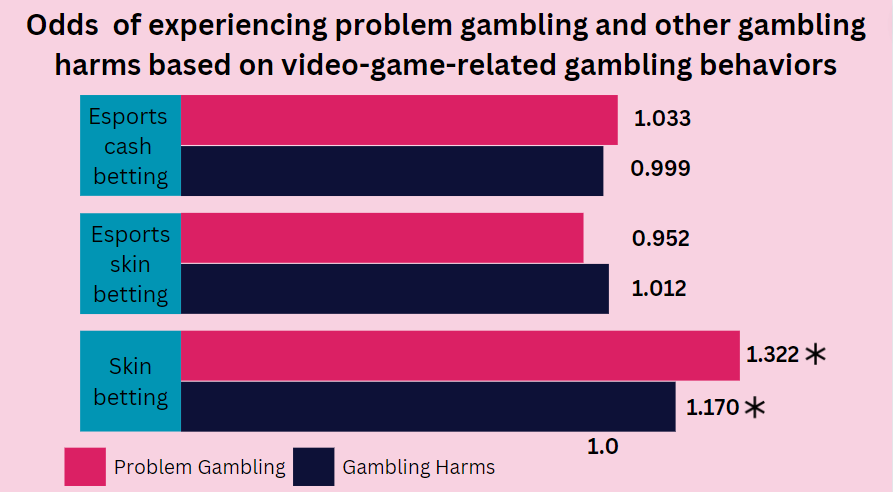Video games have drawn the attention of activists and public health advocates since as early as the 1970’s. Many of these activists have focused on the intense depictions of violence in video games and suggest that these depictions may lead to real-life violence. One area that is often neglected, however, are depictions of substance use and gambling in video games. Although regulators have begun to investigate loot boxes and their relationship with problem gambling, other forms of gambling in video games have received less attention. For example, skin betting (i.e., exchanging virtual goods for digital gambling currency) — which was first popularized by the game Counter-Strike: Global Offensive — has evolved from betting on in-game matches to skins being used as currency in other games of chance such as roulette. Many of those involved in these underground gambling networks are adolescents who are unable to engage in traditional gambling. This week, The WAGER reviews a study by Nancy Greer and colleagues that examined links between esports, skin betting, and problem gambling.
What was the research question?
How does esports and skin betting relate to other forms of gambling and gambling harms?
What did the researchers do?
The researchers recruited participants through Amazon Mechanical Turk and social media posts in online gaming communities to participate in an online survey. All participants reported either esports cash or skin betting, or gambling skins on games of chance in the past 6 months. In total, 737 participants completed the survey. The survey itself focused on four broad categories: (1) video game involvement, (2) video game-related gambling (including betting on esports), (3) traditional gambling, and (4) problem gambling and gambling-related harms. The researchers used ordinal logistic regression to test the hypothesis that video game involvement increases the likelihood of engaging in video game-related gambling, which in turn increases the likelihood of engaging in traditional gambling and experiencing gambling harms.
What did they find?
Though video game involvement related to video game-related gambling, video game-related gambling was only slightly related to traditional gambling. Consider three different video game-related types of gambling: esports cash betting, esports skin betting, and skin betting on other games of chance. Of these, only esports cash betting frequency significantly predicted involvement in traditional gambling activities. Interestingly, although the sample overall reported high rates of problem gambling and gambling harms, neither esports cash betting nor esports skin betting significantly predicted problem gambling or gambling harms. When controlling for other forms of traditional gambling, only skin gambling on games of chance was predictive of problem gambling and gambling harms (see Figure).

Figure. This figure displays the odds of experiencing problem gambling and gambling harms based on video game-related gambling behaviors. Odds ratios above 1.00 indicate that for every one unit increase in the predictor variable (video game-related gambling behaviors) the odds of being one category higher in the outcome variable (problem gambling or gambling harms) increases by X times. An odds ratio below 1.00 indicates that the odds decrease by X times. For example, a one unit increase in esports cash betting frequency would mean a participant is 1.033 times as likely to experience a one unit increase in their problem gambling severity. Only skin betting on games of chance was significantly associated with either outcome variable. Click image to enlarge.
Why do these findings matter?
These findings suggest that buying skins and esports gambling are not risk factors for problem gambling in and of themselves. Rather, skin gambling on games of chance appears to increase the risk of gambling harms. It remains unclear whether individuals who gamble skins on games of chance do so because they have exhausted other financial resources, or if skin gambling on games of chance directly increases the risk of problem gambling and other gambling harms. Regardless, these findings suggest that regulatory bodies should consider focusing on gambling operators who facilitate skin gambling on games of chance, rather than other more traditional esports focused operators.
Every study has limitations. What are the limitations in this study?
This study has significant limitations in terms of its generalizability. Participants were required to have gambled either on esports or via using skins in the past six months, so the results likely do not represent video game players as a whole. The study also failed to include anyone under the age of 18 despite the fact that many people who gamble using skins are adolescents. Additionally, due to the study’s limited sample size, the researchers were unable to conduct path analysis, an analytical technique that allows for estimating causal effects instead of only statistical associations.
For more information:
Individuals who are concerned about their gambling behaviors or simply want to know more about problem gambling may benefit from visiting the National Council on Problem Gambling. Others who want to learn more about video game addiction can find information via the Cleveland Clinic. Additional resources can be found at the BASIS Addiction Resources page.
— John Slabczynski
What do you think? Please use the comment link below to provide feedback on this article.




